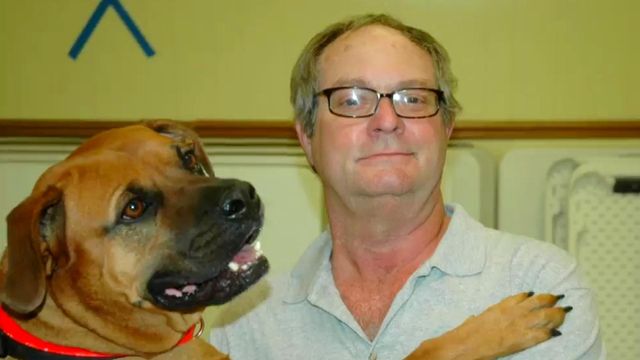Friends: Fight for disability benefits led vet to kill himself at Durham VA
Paul Shuping, a 63-year-old Navy veteran, parked his car at the Durham VA Medical Center on Feb. 15 and then used an old family .22-caliber rifle to end his life.
Posted — UpdatedShuping, who is among the estimated 20 veterans who commit suicide each day in the U.S., wasn't discovered dead in the parking garage for six days.
"I was devastated. We were all devastated when we heard what happened," said Dr. Terry Morris, who became friends with Shuping after her nonprofit, Vets to Vets, matched him with service dogs. "He seemed like he was thriving, and certain events happened recently that kind of took him in a downward spiral."
James Alston of the Triangle Veterans Outreach Center helped guide Shuping through the red tape at the Department of Veterans Affairs for partial disability benefits, which took two years to obtain. The VA's recent decision to deny Shuping full benefits set him off, Alston said.
"His biggest concern when he came in was financial," he said, adding that he thinks Shuping picked the VA hospital's parking garage for his final act for a reason.
"I really think he was trying to send a message for all veterans who are crying out for help," he said.
Donald Shuping said he also believes the VA's benefits process played a role in his brother's suicide, but he doesn't blame the Durham VA hospital.
"To the VA's benefit, I think he received excellent care," Donald Shuping said.
Sharonda Pearson, a spokeswoman for the Durham VA, didn't discuss why the hospital's police officers didn't discover Paul Shuping earlier, saying only that he found inside his car "during one of our many daily patrols."
"The loss of one veteran by suicide is one loss too many," Pearson said in a statement. "This veteran volunteered many hours to our animal therapy program and was well known and beloved by Durham VA staff."
Suicide on his mind for years
Paul Shuping first talked about taking his life after a 2013 injury, a bout with MRSA, a coma and a stroke, his brother said.
Paul Shuping even discussed his feelings in a video about the Vets to Vets program that a University of North Carolina at Chapel Hill journalism student made weeks before his death.
"I actually found myself not wanting to live and had made a plan to commit suicide," Shuping said, talking about how the service dogs gave him purpose and how he used his companions to help other vets.
The VA crisis line for veterans with suicidal thoughts receives more than 200,000 calls a year and is hiring 60 more suicide intervention counselors to meet the need. The agency also has created several apps where veterans can get help at the touch of finger any time they need it.
Gary Cunha, the Durham VA hospital's suicide prevention coordinator, said "a community partnership" is needed to convince troubled veterans there's hope and not to take their lives.
"Maybe they couldn't find the meaning and purpose in their life, but I'll do my level best to give their life meaning and purpose," Cunha said.
Even that might not have been enough for Paul Shuping, however, as his brother said the continual fight for benefits just became too much to bear.
"Veterans find themselves disabled and lose whatever they have for care and end up fighting the government for years to get their benefits," Donald Shuping said. "(I believe he wanted) to bring the light to the situation that so many veterans are in to get their rightful benefits."
A memorial service for Paul Shuping is set for Saturday in Durham.
• Credits
Copyright 2024 by Capitol Broadcasting Company. All rights reserved. This material may not be published, broadcast, rewritten or redistributed.





